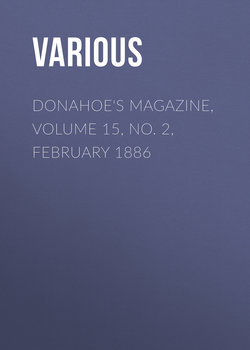Donahoe's Magazine, Volume 15, No. 2, February 1886

Реклама. ООО «ЛитРес», ИНН: 7719571260.
Оглавление
Various. Donahoe's Magazine, Volume 15, No. 2, February 1886
The Columbian Abbey of Derry
The Penitent on the Cross
The Celt in America
Southern Sketches
XVII
A Valiant Soldier of the Cross
Gerald Griffin
Mary E. Blake
George Washington
HIS CELEBRATED WHITE MULE, AND THE RACE IT MADE AWAY FROM A DEER RIFLE
Washington's Mother
A Child of Mary
Dead Man's Island
THE STORY OF AN IRISH COUNTRY TOWN. T. P. O'Connor, M. P
CHAPTER XIX. MAT BECOMES A FENIAN
CHAPTER XX. THE DEMONSTRATION
CHAPTER XXI. DEAD MAN'S ISLAND
The Boys in Green
A Christmas Carol
The Late Father Tom Burke
Our Neighbors
The Irish in Canada
The French in Canada
Quebec Province
Dominion Misrule
The Old Year's Army of Martyrs
Parnell's Strength
A Silly Threat
The Pope on Christian Education
LETTER OF LEO XIII. TO THE PRELATES OF ENGLAND ON THE ABSOLUTE NECESSITY OF RELIGION IN THE SCHOOLS
Te Deum
Rapidity of Time's Flight
Juvenile Department
CHOOSING OCCUPATIONS
A CHILD AND A WASP
THE PREHENSILE TAILED COENDOU
LITTLE QUEEN PET AND HER KINGDOM
IN THE SNOW
A LITTLE BOY'S GREETING
BOYS READ THIS
DONAHOE'S MAGAZINE. BOSTON, FEBRUARY, 1886. Notes on Current Topics
The Poles
The Catholic Mirror
Notices of Recent Publications
MISCELLANEOUS
MUSIC
Obituary
CARDINAL
BISHOPS
PRIESTS
Отрывок из книги
It is the common delusion of our day that Americans as a people are of Anglo-Saxon lineage. This has been said and reiterated, until it descends into the lowest depths of sycophancy and utter folly. It is false in fact, for above all other claimants, that of the Celt is by far the best. Glancing back to our primeval history, we find the Kelt to be the centre-figure of its legends and traditions. We are told by an old chronicle, that Brendan, an Irishman, discovered this continent about 550 A. D., and named it Irland-Kir-Mikla, or Great Eire; this is corroborated by the Scandinavians. Iceland was settled in the sixth century by Irish, and when the Norsemen settled there, they found the remains of an Irish civilization in churches, ruins, crosses and urns: thus, it is not at all improbable that the Celts of those islands sent out exploring parties who discovered for the first time the American continent. Passing over the myths and legends of that curious and quaint era, let us read the pages of authentic American history.
On that memorable October day, when the caravels of Columbus came to anchor in the New World, the Celt acted well his part in that great drama. He who first reached land, from the ships of Columbus, was a Patrick Maguiras, an Irishman. Columbus in his second voyage had on board an Irish priest, Father Boyle, and several of his crew were Celts. In the early discoveries and settlements the Kelt was ever in the van of the pioneers of Western civilization; he explored rivers, bays, and forests, while the Anglo-Saxon scarce tread on American soil until the close of the sixteenth century. The first gateway to civilization for the West, was made by priests from France, among whom were many Irish missionaries, who were forced to fly their native land and seek shelter elsewhere. St. Augustine and New Mexico were founded by the Spaniards long before a cabin was built in Jamestown, and the Spanish and French sovereigns ruled numerous flourishing dependencies in the New World ere the English Pilgrims had seen Plymouth. The Anglo-Saxons, then, were not so forward in explorations and discoveries as their neighbors, the Celts and Latins. Review the epoch of the colonial development, and we find that the Celt surpasses the Saxon.
.....
The only society that ever had the honor of enrolling the name of Washington among its members was the Friendly Knights of St. Patrick. It is an incident worthy of remark that at Yorktown it was a Celt, General O'Hara, who gave to America the symbol of England's final defeat. When the war of the Revolution was ended the Celt laid aside the sword to engage in the arts of peace and build up the industries of the country.
Twenty Irish merchants subscribed $500,000 to pay the soldiers, and they aided in every possible way the young and weak government. Then the Celtic statesmen rose to view Hamilton, Jefferson, Gov. Sullivan of New Hampshire, Gov. Sullivan of Massachusetts, De Witt Clinton of New York, John Armstrong, jr., of Pennsylvania, Calhoun, Louis McLane and George Campbell. Since those days the numbers and influence of the Celts has been constantly increasing, and were it not for the sturdy Scotchman, the Welshman, and Irishman our nation would still be a conjury of the future. On the battlefield Grant, Meade, McClellan, Scott, Sheridan, McDowell, Shields, Butler, McCook, McPherson, Kearney, Stonewall Jackson, McClernand, Rowan, Corcoran, Porter, Claiborne and Logan show the valor of the Celt. Jones, Barry, Decatur, McDonough, Stewart and Blakely are the ideals of the American sailor. Morse, McCormack, Fulton are among our greatest inventors. Jackson, Pierce, Buchanan, Wilson, Cameron, Douglas, Blaine, Arthur and Hill are our Celtic statesmen. Charles O'Conor, McVeagh, Stuart, Black, Campbell, McKinley, McLean, Rutledge are our greatest jurists. Poe, Greeley, Shea, Baker, Savage, England, Hughes, Spalding, O'Rielly, Barrett, Purcell, Keene, McCullough, Boucicault, Bennett, Connery and Jones are Celts, names famous in journalism, religion, literature and drama. The Celt, in the words of Henry Clay, are "bone of our bone" and "flesh of our flesh," thus acknowledging him to be part and parcel of our nation.
.....